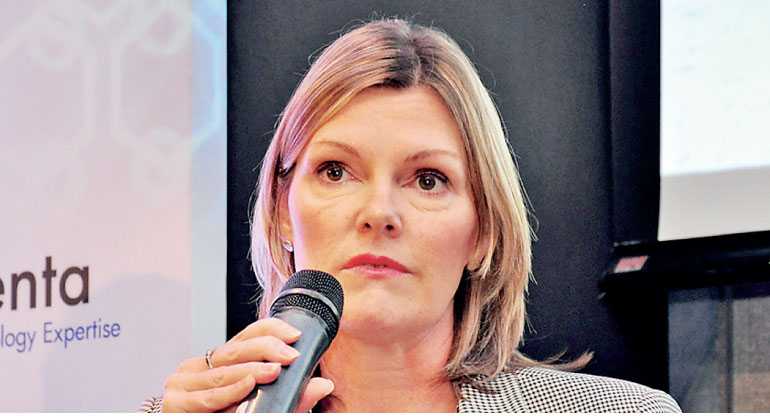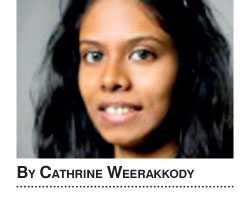Saturday Feb 21, 2026
Saturday Feb 21, 2026
Wednesday, 18 April 2018 00:00 - - {{hitsCtrl.values.hits}}

Microsoft Human Resource Director Asia Pacific Kathy Tingate
Microsoft Human Resource Director Asia Pacific Kathy Tingate who was in Sri Lanka recently to attend the SLASSCOM People Summit 2018, in an interview with FT said that many Sri Lankan organisations have embarked on digital transformation journeys and that she was happy to see HR teams playing a pivotal role in driving this transformation. Following are excerpts of the interview:
Q: What makes Microsoft different from other companies? What are the company’s core values?
A: Microsoft’s mission is to empower every person and every organisation on the planet to achieve more. Our mission guides everything we do. As a company, we believe that it is our mission to bring people together, and provide them with the tools necessary to help them achieve their potential. Our values are an important component of our culture.
Therefore we fundamentally believe that we need a culture founded in a growth mindset. It starts with a belief that everyone can grow and develop; that potential is nurtured, not predetermined; and that anyone can change their mindset. We need our people to be always learning and curious. We encourage all our employees to adopt a learn-it-all mindset and focus on building an inclusive work culture to nurture creativity, innovation and productivity.
Q: How do compensation and rewards systems support Microsoft’s growth strategy and serve as a
catalyst to achieve your goals and objectives?
A: A key area of Microsoft’s culture transformation was reviewing the systems and processes that drive behaviour including our employee performance review system. Previously all line managers would rate their subordinates’ performances on a scale from top to bottom based on a bell curve. We call it stack ranking. We have now implemented a system that focused on employee impact and contribution through a process called Connects. It allows line managers to focus on the impact a particular employee is making instead of forced ranking peers against each other. Whilst differentiation is still important, Managers now have the flexibility to allocate rewards in the manner that would best reflect the performance of their teams and individuals,
Q: What strategy do you have in place to ensure retention and engagement of employees?
A: We offer a work environment where all our employees can be themselves. Creating an inclusive workforce is  extremely important to the retention and engagement of our employees, as is providing development and growth opportunities.
extremely important to the retention and engagement of our employees, as is providing development and growth opportunities.
We know unconscious bias – the stereotypes that shape our understanding, actions, and decisions in an unconscious manner – can work against this in inadvertent ways. Building an inclusive organisation is very much about the actions and behaviour of our employees and leaders. It’s why we have all our employees complete training without any preconceived bias.
Q: What’s the most important factor you consider when hiring someone?
A: Culture fit is critical. We want to hire people who are passionate about our mission, our ambitions and are aligned with the culture we are building. A learner mindset, customer obsession, working as one team and a commitment to building a diverse and inclusive workplace are all very important.
Q: How do you foster creative and innovative thinking within Microsoft? How are ideas shared?
A: Finding ways to work together and leverage the ideas of others is important. For example, every year we have a massive global hack-a-thon. People are encouraged to hack on to something that has nothing to do with their jobs, but that they have great passion around. Several of the winners and top placers of the hackathon have gone on to become great products. Also our performance management system encourages collaboration and team work. Employees are measure on their individual contributions, their contributions to others and how they leverage others.
Q: How are you dealing with the millennial challenge as a company?
A: By 2020, millennials will represent almost half the workforce and they want to work wherever, whenever, and with connected mobile devices that are fun and easy to use.
Mobility is a key strategic tool to recruit and retain a new generation of talent. We are focused on creating workspace that is collaborative, flexible, project-oriented, and unbounded by time or geography. We have recently launched a reverse mentoring program where our young in career talent have an opportunity to mentor a member of the senior leader team. It’s an opportunity to bring the different generations in the workforce together.
Q: What is your overall long-term vision and philosophy for the HR function?
A: As the business transforms so does the HR function. HR needs to play a true business partnership role; a partnership which allows HR to quickly respond to changing business needs and improve HR’s operational efficiency through new digital technology and processes.
Q: What are you doing to ensure you continue to grow and develop as a leader?
A: Allocating time every week for personal growth and learning is really important. I find l need to be really intentional about it and define my learning goals. Whether it’s reading a book, signing up for an online course, mentoring someone more junior, pushing myself outside my comfort zone, receiving feedback from my peers and team I find it all helps me continue to grow as a learner.
Q: Finally, what are your impressions of Sri Lanka?
A: Sri Lanka as a country has an amazing opportunity to advance and leverage the digital opportunity. During my recent visit to Sri Lanka I met many customers and was impressed by the progress made by these organisations in taking right initiatives to transform HR leadership and organisational culture. Many organisations have embarked on digital transformation journeys and I was happy to see HR playing a pivotal role in driving this transformation.
(The writer is a freelance Journalist, an Associate member of CIMA (UK), a graduate in Financial Management (UK) and has a master’s degree in Financial Analysis (UK). She is currently working as an investment analyst for a MNC.)